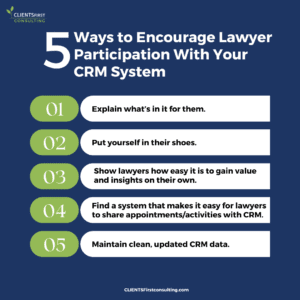But if you approach your CRM efforts as a value-added benefit that will support their marketing and business development efforts and is not difficult to use or time-consuming, you can increase CRM adoption and participation by your lawyer population at any size law firm or professional services organization. Here’s how.
- Explain what’s in it for them. Spend the time to clearly outline to users how the CRM system will directly benefit them, not just the organiztion as a whole.
- Put yourself in their shoes. Overcomplicated systems and non-technical users are a recipe for disaster. The whole point of implementing a CRM system is to improve efficiency and productivity, not hinder it, so make it easy for your lawyers to use it – or they simply won’t. In addition, lawyers use many different systems on a daily basis, such as time and billing, practice management and document management. CRM can become the one place to get all or most of what they need and allow them more time to be lawyers. Tip – look for CRM systems that include customizable dashboards to personalize daily views.
- Show lawyers how easy it is to gain value and insights from the information in the CRM on their own. Engage your marketing professionals to regularly meet with lawyers on a regular basis to gather new and updated contact information.
- Find a system that makes it easy for lawyers to share appointments and activities with CRM. This way, marketing professionals can provide strategic, proactive support for upcoming prospect and client meetings based on CRM data. For example, let’s say your marketing manager sees a calendar appointment with a prospective client on an attorney’s schedule. She could then reach out to them and proactively create pitch materials and share who-knows-who info, past matters information and other intelligence. After meetings, attorneys can be prompted to add their meeting notes in CRM too.
- Maintain clean, updated CRM data. Your CRM is only as useful and strong as the information entered into it, so if its users are inputting inaccurate data, you’ll only distill inaccurate insights from it. Ensure your data is up to date and accurate, and implement a regular data cleaning process which you can outsource if you don’t have internal resources to manage it.

While the keys to CRM adoption success will vary for each firm, the common, important thread is always the “value exchange.” If you make it easy for your attorneys to contribute valuable information – and ensure they are getting value out of the CRM – adoption and CRM success will follow.
Increasing CRM adoption and participation takes time, but it is an important investment to make and one that will provide many long-term benefits for your lawyers and your firm.
Another strategy to consider: redefining CRM success by minimizing the need for attorney adoption. Many smart firms are moving away from the traditional model of having attorneys be responsible for data entry. We’ll discuss that in an upcoming post.

